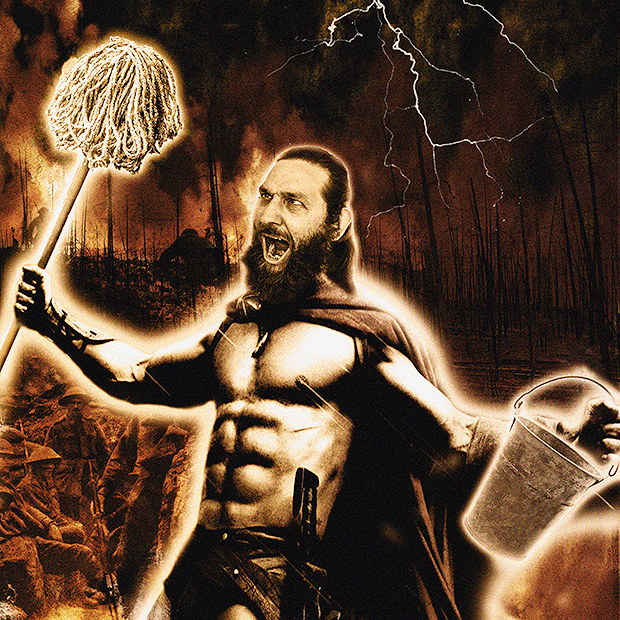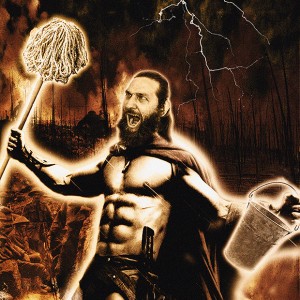300 to 1 by Monkey Poet
-Reviewed by James Webster–
I was unfortunate to miss Monkey Poet‘s epic satire of Frank Miller/Zach Snyder’s homoerotic, pro-war extravaganza at the Edinburgh Fringe this year, so I was really pleased to be able to catch it in Oxford this month. It’s a bit of an ‘out there’ idea: a teenager struggling with poetry homework is visited by Wilfred Owen and Siegfried Sassoon and ends up acting out the plot of 300, but I was genuinely delighted by his gung-ho performance, hilarious gags that blended surreal silliness with clever insight, and a pleasantly thoughtful look at the importance of Britain’s famous war poets.
This is madness … No. This. Is. Spoken Word.
From the start, Monkey Poet‘s performance was an over-the-top, enjoyable and camp joy. From the booming voice-over and absurdly exaggerated poses in the intro, to the clear-cut characterisation of the many characters, and the entertaining audience interaction, it all came together as Monkey Poet span his story with laugh-along aplomb.
With all manner of silliness going on throughout, what was perhaps most impressive was his sheer commitment, throwing himself into the action sequences, the hammy dialogue and the outlandish and/or famous characters. With visual jokes (so much excellent gurning), plenty of wordplay, character comedy and the whole thing soaked in tasty irony, not a gag was left unturned; a top performance.
Directed by one-man specialist, Gary Armstrong, the performance really brings the show to life and sells what could otherwise be a somewhat outlandish spectacle. While this results in some jokes being a tad overplayed (the horny teenage bit was somewhat overdone), it does keep the audience rapt (and shaking with laughter) throughout.
Poets, what is your profession?
The most obvious sign of Matt Panesh/Monkey Poet‘s impressive writing talent are the plentiful one-liners (and there are so many): the zingers spill out of the fast-flowing and snappy dialogue in a tide of funny. But like the best comedies, the jokes are planted deep and rooted in meaning and the moments of heartfelt poignancy are all the more effective in contrast to the laughs.
This is perhaps demonstrated best in the dialogue between Wilfred Owen and Siegfried Sassoon, as their affectionate back-and-forth frequently hints an impressive depth of feeling, while the details of their lives and (spoilers) deaths are subdued and grief-filled; a fitting juxtaposition to the overblown trumpery of the main narrative.
With an ear for jokes and a feel for feelings, Panesh‘s show is very well crafted indeed.
dulce et decorum est
Of course, the subject matter of this show is particularly relevant given we’re in the centenary year of the First World War. Such shows might run the risk of seeming exploitative (using the anniversary of a tragedy to springboard a show), but 300 to 1 manages to avoid the issue with its creative format, engagement with themes of education and sexuality, and constant subversion of the source material.
While perfectly capturing the camp absurdity and homoeroticism of 300 (underscored by the teenage protagonists repeated protestation of “It’s not gay!”), it also manages to explore the idea of repressed sexuality with some sensitivity (and humour e.g. Sassoon’s: “Wilfred is what we’d call a repressed homosexual. While I was never openly homosexual … I was a blatant homosexual”) and throwing in some criticism of class and education systems to boot.
It certainly had its flaws; there’s an occasional lack of subtlety and a number of jokes that go on a bit too long or are repeated a bit too often, and occasionally it feels like the narratiove is too closely tethered to its source material (as there’s just so much 300 ridiculousness to fit in). But all of this is easily forgiveable for the show’s overall effect.
Because at its core, this is a show that looks to break down the glorification of warfare and to get to the heart of Owen’s powerful poetry. And when the protagonist takes off into a suddenly impassioned version of Anthem for Doomed Youth the audience was struck silent by sudden and overwhelming catharsis.
Monkey Poet‘s enjoyable and intelligent satire is well-recommended and you can keep up with his future gigs via his Facebook page and his website.





